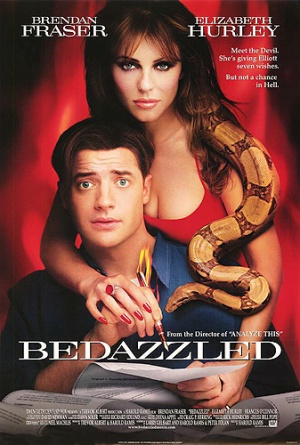Bedazzled
Harold Ramis is a fine comic writer-director, and his Groundhog Day will go down in cinematic history as one of the great American classic films. But with his adaptation of Peter Cook and Dudley Moore’s Bedazzled of 1967 (directed by Stanley Donen), he has bitten off more than he can chew. Together with Larry Gelbart and Peter Tolan, he has completely re-written the earlier film for a contemporary audience, and although the result is often very funny, it has missed the most important thing, not only about the 1967 version but also about the mythic archetype with which he is working—namely the Faust legend. This is the reality of the soul that the Faust figure—a short-order cook called Stanley Moon (Mr Moore) in the 1967 version or a computer nerd called Elliot Richards (Brendan Fraser) in the new one—brings to market.
Pete and Dud, it’s true, also took much of the terror and the mystery out of the story by making the Mephistopheles, played by Peter Cook, an attractive, witty, urbane character who has an uncharacteristic fit of generosity at the end. Yet this devil’s attractiveness is like that of Milton’s Satan: almost a necessity if we are to understand the real meaning of the cosmic drama. Not so Elizabeth Hurley’s temptress in Mr Ramis’s film. Partly this is because of the change of sex. It is hard to take with sufficient seriousness an occasional glimpse of the cloven hoof when it is at the end of a shapely leg and shod in a three inch spike heel. There’s deviltry in this image all right, but it is of too earthy a kind to be quite persuasive as even a comic version of cosmic evil.
But making the devil a woman was done for precisely this reason: that is, to prepare us for the final revelation that, though rather a minx (the least that one can expect of her, after all!), Miss Hurley’s Beelzebub is really just a softie after all. In other words, in the earlier film we still have the sense that the devil’s attractiveness is a mask for something much more sinister, even appalling. In Ramis’s version the opposite is the case. The devil’s evil acts are just pranks, disguising a reality that is little more than a sweet mischievousness. There is a marvelous scene in which Miss Hurley appears as a teacher in a boys’ school in a micro-miniskirt, telling her leering, open-mouthed charges that their homework is to “watch lots of TV and play plenty of video games.” When Elliot remonstrates with her after the failure of yet another of the seven wishes for which he has sold his soul, she pouts and confesses to being “naughty,” wondering hopefully if a spanking is in order.
So it is throughout the film that the very idea of evil is easily assimilated to such pop-cultural emanations as S & M fantasies or Goth dress-up chic. At the film’s climax, Miss Hurley attempts to be threatening with a belatedly remorseful Elliot, offering to “slip into something more terrifying.” There follows some familiar cinematic imagery of flames and devils and an apparent casting of Elliot into the fiery pit, but when he refuses to knuckle under to the devil’s importunity he is simply returned to earth and no harm done. Satan confesses that the hell stuff was just “special effects” designed to frighten the susceptible into doing what they’re told. “It didn’t work with you,” she says easily.
It’s a shame that there is no whiff of brimstone here, as there was once or twice with Peter Cook’s Satan—or anywhere else in the film. We know it is all special effects, so it doesn’t frighten us either. A mockery cannot have its proper effect if it doesn’t believe in the reality of what it mocks. Even so, the film is very close to winning a star for the sheer exuberance and wit of its humor. Both Mr Fraser and Miss Hurley, though neither will ever be a great actor, show us that they can do things we didn’t think they could do, and there are one or two moments where mere cleverness threatens to turn into something more profound, as for example when it hints at the devil’s delight in the opportunities afforded her by the therapeutic culture and the self-esteem movement. But these hints are never taken up and developed, and we must conclude the film to be, if not bad, still a disappointment.
Discover more from James Bowman
Subscribe to get the latest posts to your email.






